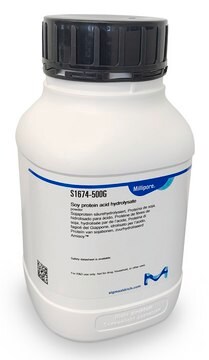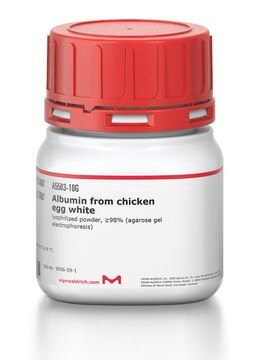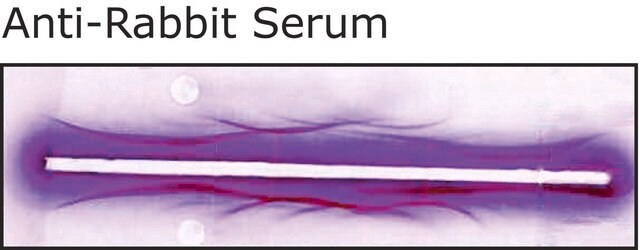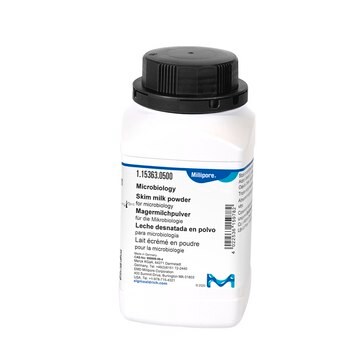Alle Fotos(1)
Wichtige Dokumente
S2519
Anti-Soy Protein antibody produced in rabbit
fractionated antiserum, buffered aqueous solution
Anmeldenzur Ansicht organisationsspezifischer und vertraglich vereinbarter Preise
Alle Fotos(1)
About This Item
Empfohlene Produkte
Biologische Quelle
rabbit
Qualitätsniveau
Konjugat
unconjugated
Antikörperform
fractionated antiserum
Antikörper-Produkttyp
primary antibodies
Klon
polyclonal
Form
buffered aqueous solution
Speziesreaktivität
soy
Methode(n)
dot blot: 1:500
indirect ELISA: 1:5,000
Versandbedingung
dry ice
Lagertemp.
−20°C
Posttranslationale Modifikation Target
unmodified
Suchen Sie nach ähnlichen Produkten? Aufrufen Leitfaden zum Produktvergleich
Verwandte Kategorien
Allgemeine Beschreibung
Some cross-reaction is observed with extracts from wheat flour and ovalbumin; no cross-reaction is observed with extracts from maize, rice, potato flour, casein, or meat.
Soy protein is obtained from soybeans. This legume is free of cholesterol and is low in saturated fat. It is mainly used as a replacement for animal proteins in an individual′s diet. This vegetable food has all eight essential amino acids. Soy protein can be used as meat extenders or analogues.
Immunogen
renatured soy protein extracted from soy acetone powder with hot urea.
Anwendung
Anti-Soy Protein antibody produced in rabbit has been used in:
- enzyme-linked immunosorbent assay (ELISA)
- supershift analysis
- fluorescent imaging
- immunostaining to probe polyvinylene diflouride (PVDF)-bound proteins for cross-reactivity
Anti-Soy Protein antibody produced in rabbit was used for soy quantification in natural rubber latex glove extracts by ELISA at 1:2000 dilution. It was used as a control in supershift analysis of growth-hormone-induced protein binding to lactogenic hormone-responsive region.
Biochem./physiol. Wirkung
Soy protein is a rich source of isoflavones that act as estrogen analogs. They exert both estrogenic and anti-estrogenic effects depending on the tissue in which they act. Isoflavones effect the lipid and bone metabolism and may act as a potential alternative to estrogen in post-menopausal women.
Zielbeschreibung
Soy protein in a variety of forms is the basis of many low cholesterol foods and may also be incorporated in animal meat products.
Physikalische Form
Solution in 0.01 M phosphate buffered saline, pH 7.4, containing 15 mM sodium azide.
Haftungsausschluss
Unless otherwise stated in our catalog or other company documentation accompanying the product(s), our products are intended for research use only and are not to be used for any other purpose, which includes but is not limited to, unauthorized commercial uses, in vitro diagnostic uses, ex vivo or in vivo therapeutic uses or any type of consumption or application to humans or animals.
Sie haben nicht das passende Produkt gefunden?
Probieren Sie unser Produkt-Auswahlhilfe. aus.
Lagerklassenschlüssel
10 - Combustible liquids
Flammpunkt (°F)
Not applicable
Flammpunkt (°C)
Not applicable
Hier finden Sie alle aktuellen Versionen:
Besitzen Sie dieses Produkt bereits?
In der Dokumentenbibliothek finden Sie die Dokumentation zu den Produkten, die Sie kürzlich erworben haben.
J S Freeth et al.
Endocrinology, 139(1), 20-28 (1998-01-08)
We have previously described two families (H and M) with GH binding protein-positive Laron Syndrome (LS), proposed to have one or more post GHR signaling defects. In the present study, we have examined whether the signal transducers and activators of
Flight movement and spatial distribution of immunomarked thrips in onion, potato, and tomato
Fernandes FL and Fernandes MES
Pesquisa Agropecuaria Brasileira, 50(5), 399-406 (2015)
Marion Busch et al.
The Journal of investigative dermatology, 128(4), 890-896 (2007-12-01)
Currently, most medical gloves are produced with a low content of natural rubber latex (NRL) protein. However, they may be substituted by proteins of foreign origin to maintain specific properties of the material. The aim of this study was to
Activation of the signal transducers and activators of transcription signaling pathway by growth hormone (GH) in skin fibroblasts from normal and GH binding protein-positive Laron Syndrome children
Freeth JS, et al.
Endocrinology, 139(1), 20-28 (1998)
Partial characterization of a vicilin-like glycoprotein from seeds of flowering tobacco (Nicotiana sylvestris)
Gerlach JQ, et al.
Journal of Botany, 20-28 (2009)
Unser Team von Wissenschaftlern verfügt über Erfahrung in allen Forschungsbereichen einschließlich Life Science, Materialwissenschaften, chemischer Synthese, Chromatographie, Analytik und vielen mehr..
Setzen Sie sich mit dem technischen Dienst in Verbindung.







